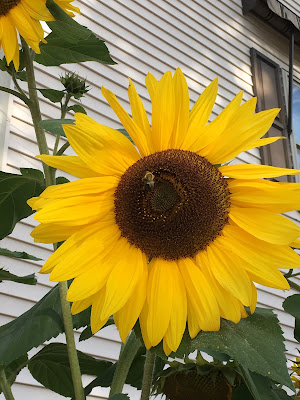In early September, at the end of a long, busy summer, I learned that my long-time friend, colleague, and fellow writer Jack Leax had died.
Jack touched many lives through his 40 years of teaching and in his local community ~ and many more through his many books. Jack and our Department Chair, Charles, were the first Houghton folks I met; they ferried me from the airport in Rochester down into the hills and cornfields and dairy land of our little village when I was a candidate for the teaching post I held for 35 years. That was in May of 1984. Jack was already well known, both locally and within the communities of Christian writers."Christian writer" is not a term either of us chose or liked; our preferred point of identification was, simply, "writer." As it happened, we are also poets, so that term works as well. By personal conviction and belief, we are both Christian. Jack's publications, contacts, and readership were widely known among these folks. Mine weren't. My publications were many fewer and scattered around. But this aversion to limiting one's identification as a writer to one modifier was just one of many characteristics we shared.
Jack did many things to spread his largess around; I will mention a few that directly benefited me.
Bringing William Stafford to campus, one of many writers Jack brought in to work with students or to give readings, continues to be a significant touchstone from my first years in Houghton. I had known of William Stafford before he came to campus. What Stafford had to offer as a poet, teacher, human being, and moral guidepost requires its own long, long discussion; but let me simply note that Stafford's presence was as a fellow traveler. He had no use for the competitiveness and celebrity so common among writers then -- and now. Jack, naturally, understood the kinship.
After his retirement, Jack and Linda Mills-Woolsey, an extremely talented colleague/poet/writer, and I met to read and discuss our work-in-progress. For a time, our meetings were fairly frequent, but gradually they became sporadic as our schedules involved other demands, many of them medical appointments and care responsibilities. This small, last community of poets was energizing and instructive for all of us.
As our teaching careers grew long and prospects of retirement loomed closer, Jack and I had many discussions about what we called "the end game." Jack was very intentional about this stage of life events as he was about everything else related to his teaching and writing. I have been less intentional, preferring to stay in the moment, usually. Still, we observed and discussed how various colleagues exited teaching and how various writers "stopped" producing. For the observant, there are many cautionary stories out there and a few, many fewer, instructive ones.
I don't know
whether Jack was happy with how his retirement plan worked out, but I
know he stayed engaged and kept writing until at the very, very end he
couldn't.
Bringing Sally Craft of Wordfarm, then a fairly new literary publisher, to campus, was another gift from Jack. During her short stay, at Jack's suggestion and with his encouragement, I gave her my manuscript for Living on the Flood Plain. She read it over-night and told me in the morning that Wordfarm would like to publish it. That encouragement, decision, and resulting publication were life-changing for the writer in me.
Assessing Jack's legacy and impact will require more time and many more voices.
Still, as one of those voices, I am enormously grateful to have known and worked along side Jack Leax for nearly forty years. Thank you, Jack. We shall meet again on that other shore, on that great gettin' up morning.


No comments:
Post a Comment